Julie Mathison's Blog
July 31, 2023
Happy birthday Starr Creek Press!
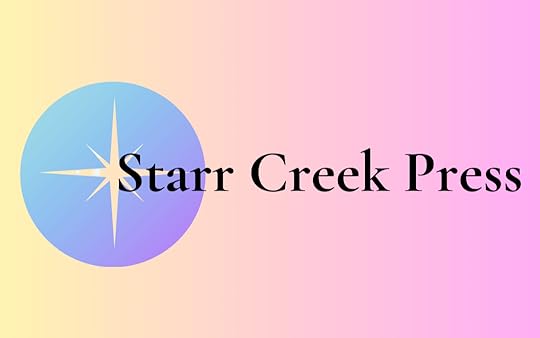
Starr Creek Press is celebrating three years in print! Check out my blog post on the good, the bad and the ugly. Mostly good! To honor this event, I’m running a $.99 sale on the ebook version of Believe, my MG award-winner that started it all. Also in this month’s update: a BookSweeps promotion for mystery lovers, and an interview with me on the Charlotte’s Reader’s Podcast about my own debut mystery. Click here to find out more: READ MORE
Published on July 31, 2023 15:27
July 1, 2023
Upvote BELIEVE!
BELIEVE is on Listopia! Many thanks to @ingramsparkbooks for including BELIEVE on their Children's Chapter Books: Heroic Adventures list. If you enjoyed BELIEVE, would you take a moment to upvote it on the list? Here's the link: Heroic Adventures
Published on July 01, 2023 01:57
•
Tags:
curatedindie, ingramsparkauthor-ingramspark
March 3, 2023
New Old Rus covers!
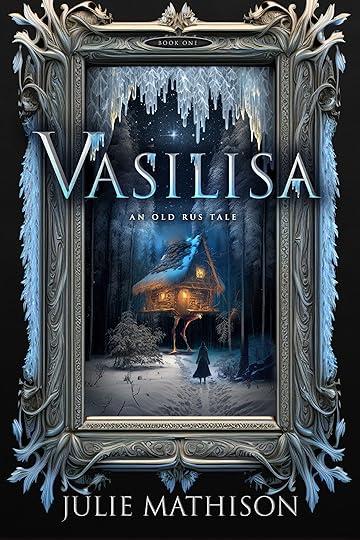
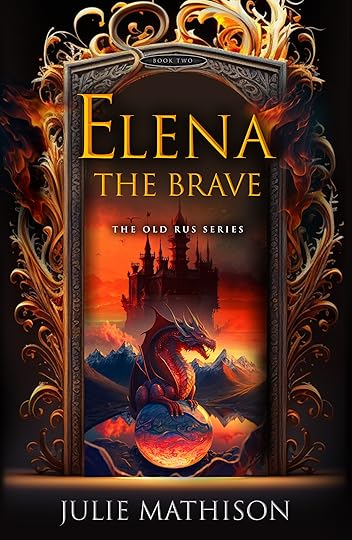
Check out my Old Rus cover rebrands! I'm in love with this new look and excited to give these books a little makeover as I begin preparations to begin Pushkin's Ring, due out in early 2024. In the meantime, The Starlet Letter will be coming out June 6th, so stay tuned!
Published on March 03, 2023 11:38
February 4, 2023
Starred Review!
 Super excited that Elena the Brave has gotten a starred review from Kirkus! Less than 10% of all books reviewed get a star from Kirkus, so I couldn't be more thrilled or gratified. They've also chosen to feature it as one of eight indie books in their February edition of Kirkus Magazine. This is timely since I'm just about to break ground on Pushkin's Ring, Book Three in the Old Rus series. As most of you know, these books are standalone sequels -- in Pushkin's Ring, we'll be going back in time a bit, and there's a mystery solved about the origins of the Vasilisa and Elena's maternal line -- but no spoilers! I'll be sharing more in the coming weeks, as well as lots of details about the June 6th release of The Starlet Letter, the first book in my forthcoming YA mystery series, The Canary House Mysteries. It will be up soon on Netgalley and Edelwiess for pre-pub review. Lots of news popping this year, so I'll keep you all posted :)
Super excited that Elena the Brave has gotten a starred review from Kirkus! Less than 10% of all books reviewed get a star from Kirkus, so I couldn't be more thrilled or gratified. They've also chosen to feature it as one of eight indie books in their February edition of Kirkus Magazine. This is timely since I'm just about to break ground on Pushkin's Ring, Book Three in the Old Rus series. As most of you know, these books are standalone sequels -- in Pushkin's Ring, we'll be going back in time a bit, and there's a mystery solved about the origins of the Vasilisa and Elena's maternal line -- but no spoilers! I'll be sharing more in the coming weeks, as well as lots of details about the June 6th release of The Starlet Letter, the first book in my forthcoming YA mystery series, The Canary House Mysteries. It will be up soon on Netgalley and Edelwiess for pre-pub review. Lots of news popping this year, so I'll keep you all posted :)
Published on February 04, 2023 15:39
November 27, 2022
Awards News!
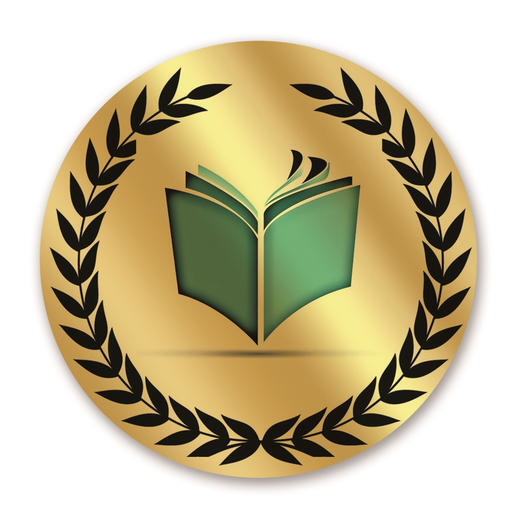 I'm happy to announce that BELIEVE has won the 2022 Best Book Award for Children's Fiction from American Book Fest! And ELENA THE BRAVE topped out as one of 5 YA Semifinalists in the 2021 BookLife Prize from the folks at Publisher's Weekly. It's really nice to garner these accolades for the books I've poured my heart into, but the best part of being a writer is connecting with readers. I'll be coming out with THE STARLET LETTER, my first YA mystery, in 2023, followed by the third and last installment of my Old Rus series, THE ALATYR STONE, hopefully in late 2023. Stay tuned, and thanks for your readership!
I'm happy to announce that BELIEVE has won the 2022 Best Book Award for Children's Fiction from American Book Fest! And ELENA THE BRAVE topped out as one of 5 YA Semifinalists in the 2021 BookLife Prize from the folks at Publisher's Weekly. It's really nice to garner these accolades for the books I've poured my heart into, but the best part of being a writer is connecting with readers. I'll be coming out with THE STARLET LETTER, my first YA mystery, in 2023, followed by the third and last installment of my Old Rus series, THE ALATYR STONE, hopefully in late 2023. Stay tuned, and thanks for your readership!
Published on November 27, 2022 15:45
October 31, 2022
The Ukrainain Identity
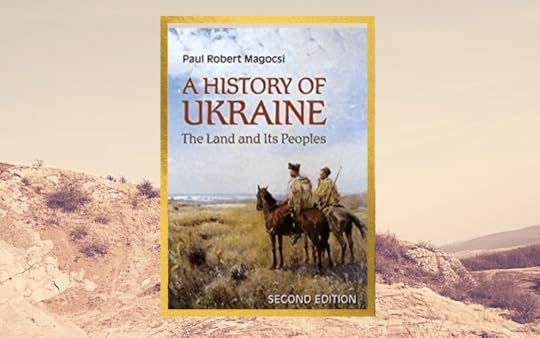
When I began writing the Old Rus series, I knew only that I wanted to work with what I thought of as Russian folklore. Vasilisa drew largely on the folk canon of Russian lore, but with Elena the Brave, I dipped into another canon altogether — the byliny, oral ballads based on an idealized 9th century Kievan Rus. At the time, I thought of Kiev as the cradle of Russia, although in my research, I did peruse books like the one pictured above, which I highly recommend. But it was not until the invasion of Ukraine that I really began to grapple with the nature of Kievan Rus’ history, and it’s relationship to the Russian and Ukrainian identities — and as it turns out, the Polish too.
History is written by the victors, and the victors aren’t just the ones that win the wars. They are those who rule the citadels of academia too. The history of Ukraine, and the nature (and even existence) of a distinctly Ukrainian identity, has been shaped by four distinct historical perspectives. The dominant one, taught in the Western world until recently, is the Russian version, but there are three other narratives as well — the Ukrainian, the Soviet, and the Polish.
The first scholarly histories of Eastern Europe were not begun until the late eighteenth and early nineteenth centuries, rather late in the game. At that time, the only East Slavic state in existence was the Russian Empire, headed by a dynastic tsar from Moscow, and later St. Petersburg. The historical scheme that supported the tsarist state featured a Muscovite tsardom that delivered Russia from internecine wars among the lesser princes, and from the Mongol yoke, in the fourteenth century — as only an all-powerful leader could. To establish a proper lineage for the dynasty, fourteenth century monks recopied earlier chronicles, “improving” them to trace the descent of the Muscovite rulers to the princes of Kievan Rus, who could in turn be traced back to the semi-legendary, Varangian (Viking) ruler of Novgorod, Riuryk. This created a kind of “manifest destiny” for Russia, deemed to be the central identity of a great, pan-Slavic state — the cradle of which was Kiev. In this narrative, after the Mongol invasion of the mid-thirteenth century and the destruction of Kiev, the political center of Russia, and its noble counterparts, migrated northwards, eventually to Moscow. This nineteenth century narrative emphasized the duty of the “mother country” to reunify Veliko-Rus (Great Russia), Belo-Rus (White Russia), and Malo-Rus (Little Russia) — an idea still employed in the current conflict of today.
The beginning of a distinctly Ukrainian awareness coincided with the appearance of the first general histories of Ukraine in the eighteenth century. Styled as histories of “Little Russia,” the first histories centered around accounts of the Zaporozhian Cossacks during the sixteenth and seventeenth centuries, and later culminated in a mid-nineteenth century work of uncertain authorship, the first to treat Ukraine not as a province of Russia or Poland, but as an independent country deriving from Kievan times. Ukraine attained the height of its powers during the Cossack era in this narrative, and began to decline only in the eighteenth century after coming increasingly under Muscovite, and later Russian, rule. This sparked a kind of national revival, not only among historians, but in the popular imagination as realized by Ukrainian poets, folklorists, and linguists. The idealized Ukrainian state, and the essential nature of its people, was not crafted in the image of the strong, central state beholden to an absolute ruler, but rather the egalitarian ideals of the Cossacks, who were “equal among themselves,” and who consistently resisted Polish rule through a series of uprisings, particularly in the seventeenth century. While these uprisings were considered the height of Ukrainian national identity, they were seen as the turning point in the Polish historical narrative, the beginning of Poland’s decline as a geopolitical power.
The Polish have their own perception of Ukrainian history, influenced by pre-World War I histories that depicted the Poles as discovering an uncivilized frontier when they annexed Ukraine in the sixteenth century, into which they brought culture and the bases for state formation. Because of the intermarriage of certain princely families, the Kieven inheritance was deemed to belong to the Poles. As for the fourth perspective, with the creation of the Soviet state after the Bolshevik revolution, the Russian narrative was progressively tweaked to conform to Marxist ideals, especially after Stalin came to power in the 1930s and most members of the Ukrainian historical school were exiled or imprisoned. In the Great Russian Bolshevik version of Marxism, the problem of national identities was solved with typically Marxist pragmatism — through the theory of the “lesser evil,” which posited that while the annexation of non-Russian peoples was an evil, being annexed to another, dominant state would prove a greater evil to states unable to maintain their own independence.
Which version is the real one? Obviously, there are no absolute answers in the domain of history, which is in turn the domain of story. This insight is perhaps the most useful — that it is how history is used, and abused, that most marks a narrative as “correct” or “incorrect.” Clearly, facts underlie historical narratives, and facts must be supported by real scholarship to stand the best chance of validating a narrative. Yet, it is the narrative itself that is most subject to corruption, for history is the most often a chronicle of power.
For my part, as I begin preparations to write The Alatyr Stone, concluding my Old Rus series, I find myself mindful of trying to get it right, at least in my small way. You can tell me how I’ve done when the book comes out next year. In the meantime, I will continue to be a student of this extraordinary part of the world, exemplified, for me, by the resilience and indomitable spirit of its people.
Published on October 31, 2022 09:41
March 2, 2022
Giveaway Winners Announced!
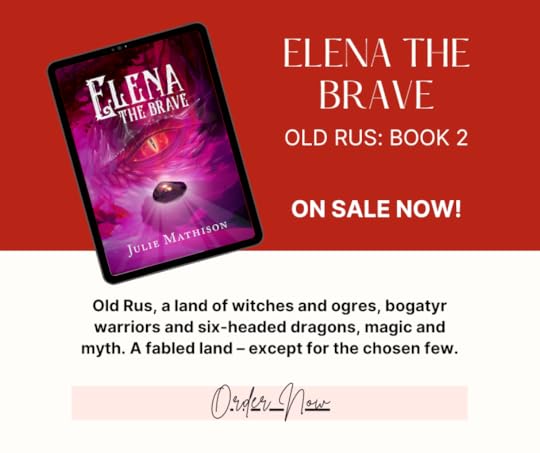 Congratulations to Melisa, Heather and Ed for each winning a signed, paperback copy of Elena the Brave in my recently concluded Goodreads Giveaway! With over 1,600 entrants, I'm thrilled to announce these three winners. I took a peek at each of their profiles and found myself smiling -- these opportunities remind me of everything I love about Goodreads. It really is a place where people can simply be passionate readers and come together to share. Thanks to ALL the people who entered my Giveaway -- The Alatyr Stone, Book Three of the Old Rus series, will be out in early 2023, so I'll be running a new Giveaway then. Stay posted!
Congratulations to Melisa, Heather and Ed for each winning a signed, paperback copy of Elena the Brave in my recently concluded Goodreads Giveaway! With over 1,600 entrants, I'm thrilled to announce these three winners. I took a peek at each of their profiles and found myself smiling -- these opportunities remind me of everything I love about Goodreads. It really is a place where people can simply be passionate readers and come together to share. Thanks to ALL the people who entered my Giveaway -- The Alatyr Stone, Book Three of the Old Rus series, will be out in early 2023, so I'll be running a new Giveaway then. Stay posted!
Published on March 02, 2022 08:20
March 1, 2022
Elena the Brave on sale today!
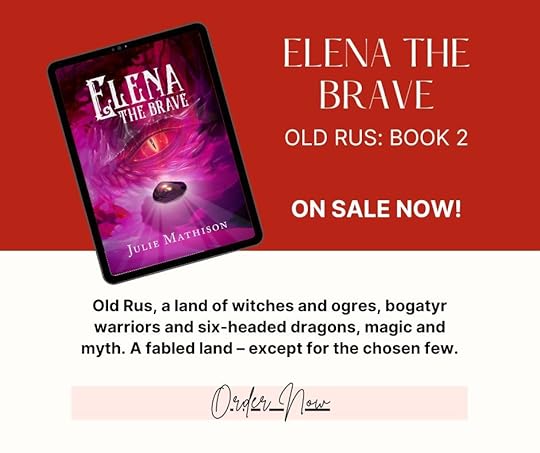 𝐸𝑙𝑒𝑛𝑎 𝑡ℎ𝑒 𝐵𝑟𝑎𝑣𝑒 is out today! (You can purchase in ebook, paperback or hardcover here: BUY NOW )
𝐸𝑙𝑒𝑛𝑎 𝑡ℎ𝑒 𝐵𝑟𝑎𝑣𝑒 is out today! (You can purchase in ebook, paperback or hardcover here: BUY NOW ) I've been thinking about this day all week as I listen to the coverage of the Ukrainian invasion and all the heartbreak there. I don't have Slavic ancestry -- Scandinavia is as close as I get to that part of the world -- but I have spent hundreds of hours studying the extraordinary folkloric heritage of Kievan Rus. Although it feels strange, even wrong, to celebrate anything at this time, I hope this celebration is one of profound appreciation for that heritage, and the spirit of the Ukrainian people. If you've read Vasilisa and would like to continue the adventure, or just dive in (Elena the Brave is also a stand-alone novel) you can purchase from Amazon at the link above or from other vendors through my website here: OTHER VENDORS
All my love and thanks to those of you who have supported my publication adventures! I literally could not have done it without you.
Published on March 01, 2022 10:28
February 22, 2022
Interview with Ms. Yingling Reads!
 Check out my interview with Karen Yingling of Ms. Yingling Reads, her long-standing blog, sixteen years and counting. Read here for a librarian's perspective on getting the right books into kids' hands and more.
Check out my interview with Karen Yingling of Ms. Yingling Reads, her long-standing blog, sixteen years and counting. Read here for a librarian's perspective on getting the right books into kids' hands and more. READ INTERVIEW HERE
Published on February 22, 2022 17:57
February 21, 2022
Good company!
 ELENA THE BRAVE is in good company! Check out these action and adventure ARCs featured this week on Book Sirens. And stay tuned -- ELENA THE BRAVE is due out next Tuesday, March 1st!
ELENA THE BRAVE is in good company! Check out these action and adventure ARCs featured this week on Book Sirens. And stay tuned -- ELENA THE BRAVE is due out next Tuesday, March 1st!CLICK HERE FOR BOOKSIRENS PICKS
Published on February 21, 2022 17:47



